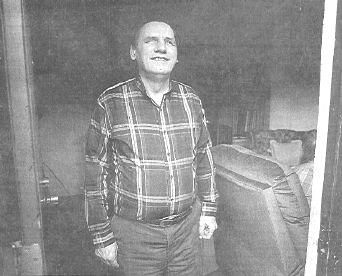The Resident
People First of Oregon
Fairview's Closing Chapter
![]()
The Resident

Charles Richard Parks was abandoned as a small child and spent 11 years at the Fairview Training Center, a home for people with mental and physical disabilities because he was losing his vision.
Now 53, he lives with two other former Fairview residents in a Portland apartment.
"You had your good times; you had your bad times," Charles Richard Parks said.
The state took custody of Parks after relatives abandoned him in a berry field at about age 4. After a series of foster homes, he was placed at Fairview in 1955 at age 9. He figures he fell through the cracks, too "blind" to be in public school but not blind enough for the Oregon School for the Blind.
At Fairview, "I couldn't get the one on-one education that I wanted," he said. No one taught Braille, and large print materials didn't exist at Fairview. "I had to use a magnifying glass to read things .... I had to stand on top of the TV to see it."
And he definitely remembers the Fairview workers. "I had some aides that were mean and some that were : good," he said.
Once, an aide "hit me with a wet towel," he said. His aunt noticed the bruises when Parks visited her. She demanded an explanation, and the aide was fired. But Parks also was taken to task.
"The head charge on the cottage called me up and chewed me out for getting that one aide fired," he said. "After that, I learned to say nothing about what went on."
He remembers more good times than bad. He swam at the YMCA before Fairview got its own pool and watched movies in the office until the gym was built. He remembers tricycles, wagons and scooters, campus dances and Fourth of July parades.
He saw seizure-prone friends die. One drowned, he said, after being left unattended in a bathtub. He held the body of another friend who had fallen and hit his head on the sidewalk.
He worked in the baby cottage, tending to infants whose bodies were "all bent up." He fed and diapered infants and watched as babies near death were moved to a room next to the office and placed on a 24-hour watch.
Before his release, Parks lived off campus in Prigg Cottage for about 11/2 years. There, the staff sometimes locked residents in wards.
"A lot of times it was all day. If anybody misbehaved... the whole ward on Prigg would be locked up," Parks said. On Saturday mornings, the ward was closed" for cleanup, he said.
For the first time, the teen-ager felt as though he was in prison. Suddenly one day, he was released. He was 19.
"I remember signing myself out," he said. "It was a triple copy, white, yellow and pink. They had marked on there 'indefinite vacation.'..
No one prepared him for life after Fairview. "It was like leaving one world and going into another. You had to learn the hard way about what behavior society would accept."
The state Commission for the Blind took him under its wing and sent him to a rehabilitation program in Seattle. He held various jobs after that.
He now shares a Portland apartment with two former Fairview friends who work in the community. He is blind and collects a disability check. The last time he returned to Fairview was in the 1970s.
I'm just glad I'm out of there," he said.